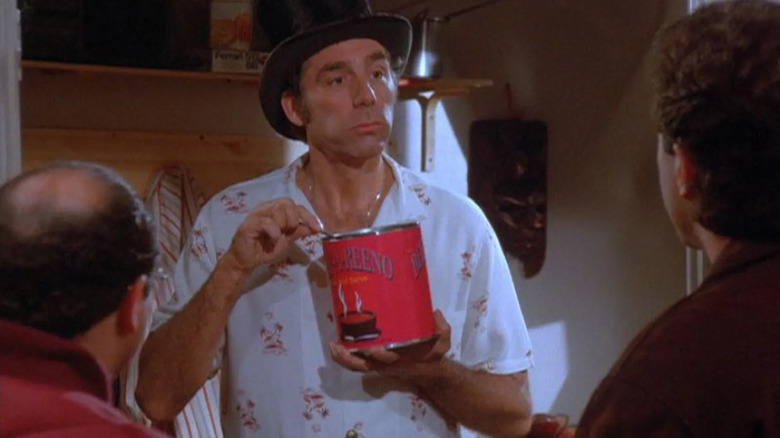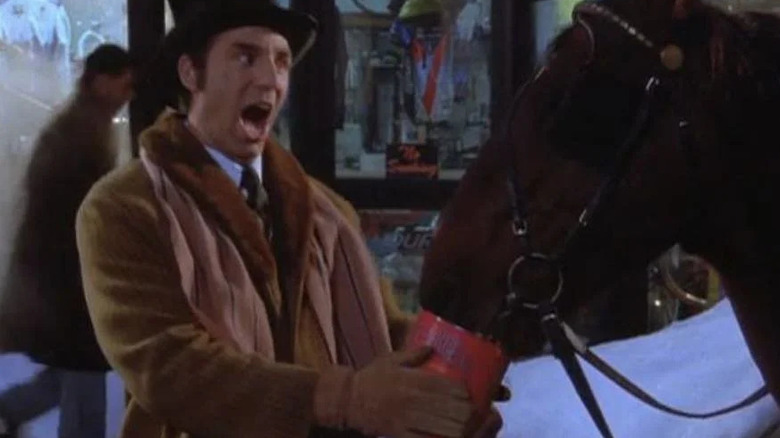Why Pasta Giant Chef Boyardee Refused To Be Mentioned On Seinfeld
In the "Seinfeld" episode "The Rye" (January 4, 1996), Kramer (Michael Richards, star of "The Michael Richards Show") becomes enamored of a canned pasta product called Beef-A-Reeno, mostly because he can buy it on the cheap from his local bulk grocery outlet. In this episode, he has also taken a job as a hansom cab driver, and was put in charge of a horse named Rusty that he leads around New York. When Kramer finds that he has purchased way too much Beef-A-Reeno, he figures he can feed it to Rusty, which the horse inexplicably loves.
The canned pasta, however, causes the horse to suffer from uncontrollable flatulence, something that makes Kramer's hansom cab passengers notice right away. Because the horse smells so bad, some of his customers end their ride early, only to return home and interfere with George (Jason Alexander), who was busy with schemes of his own in the episode's "A"-plot.
"Seinfeld" was a massive success, of course, and most of the name-brand products mentioned on the show didn't mind the association. Even if Jerry (Jerry Seinfeld) was mentioning something in a negative light, it was positive brand placement for whatever he was talking about. "Seinfeld" rarely invented fake products for their scripts (common in movies and TV), as to retain an element of realism.
But not everyone was flattered by their product being featured on "Seinfeld," which was certainly true of Chef Boyardee, a brand founded by real-life chef Ettore Boiardi in 1928, and owned by American Home Foods in 1996 when "Seinfeld" aired. It seems that the original script for "The Rye" called the "Beef-A-Reeno" product to actually be Chef Boyardee's famed Beefaroni. The makers of "Seinfeld" asked American Home Foods for their approval, and they turned it down. According to a 1997 EW interview with Glenn Padnick, the president of Castle Rock Television, it was one of the only times a product didn't give approval.
Chef Boyardee wouldn't let their Beefaroni be used for a farting horse joke
It's easy to understand why. In most instances, "Seinfeld" only referred to real-life products in a neutral sense. If someone was caught eating a (Godzilla-endorsed) Snickers bar with a knife and fork, it didn't reflect poorly on Mars, Inc., the candy bar's owner. With the Beef-A-Reeno, however, the "Seinfeld" writers implied that it was an unhealthy product prone to give gas to a horse. While it's unlikely that anyone buying Chef Boyaredee's Beefaroni is feeding it to horses, the health implications remain. Padnick noted that Castle Rock Television, the production company that was overseeing "Seinfeld," only asked for permission to use product names if they felt there may have been a negative slant to their presentation. "Virtually every product that is mentioned on our show," he said, "even if it was semi-unflattering, has loved it." Often, they just used product names openly.
Indeed, in "The Rye," Kramer shows off a trunk of bulk-sized products, and they mention Eggo Waffles and Starkist Tuna by name. When Padnick sent a letter to Chef Boyardee, however, they said the name had to be changed. Hence why Kramer — and Rusty — chow down on Beef-A-Reeno, and not Beefaroni.
Of course, the product names became a little legally sticky when Jerry Seinfeld began shilling for Nike in real life, and Jason Alexander began selling Rold Gold pretzels. When the actors signed those contracts, they tactfully ceased mentioning those particular brands on the air. Jerry Seinfeld continued to wear Nike products as he always did, but writers became cautious about mentioning them in a positive light, as to avoid any sense of impropriety.
Chef Boyardee, meanwhile, was purchased by ConAgra in 2000. The canned pasta products are still being distributed to this day.

